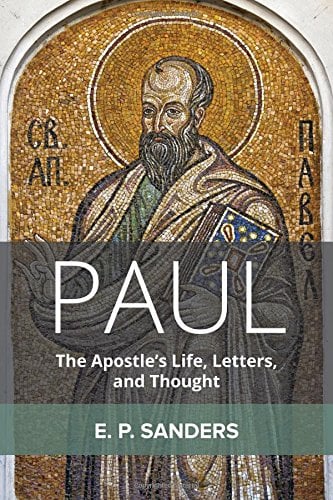pp. 215-16– He goes with the ‘knows how to acquire his own vessel (i.e. wife) translation of 4.1-8. In every other passage in the NT, the verb ktaomai means to acquire, take, get and in ben Sira 36.24 it means acquire a wife.
p. 218– Josephus says “The Law recognizes no sexual connections except the natural union of man and wife, and that only for the procreation of children.” (Apion, 2.199). The present passage is the only place Paul says something negative about sexual desire (epithymia). This view comes from the more ascetical Diaspora Judaism influenced by Greek asceticism, and does not come from Palestinian Judaism. He thinks the real meaning here of Paul is that a man should not acquire a wife only to satisfy sexual desire. He finds 4.5 interesting ‘not like the Gentiles who do not know God’ — this is straight out of a synagogue message for Jews, but Paul apparently has temporarily forgotten he is addressing Gentiles. Sanders says what doesn’t much change over the course of Paul’s letters is his ethics or teaching on behavior, including sexual behavior. Two aspects of Judaism Paul never questioned— monotheism and sexual ethics.
p. 220— He calls 1 Thess. 2.15-16 a polemical or nasty comments, since actually Jews didn’t kill Jesus, or their prophets (well actually Neh. 9.26 says they did on occasion). He suggests ‘drove us out’ means the Christians of Jerusalem (see Acts 8.1), [but Paul may well be referring to himself and others like him]. “They hinder us from evangelizing Gentiles’ is presumably the chief cause of the anger; he was opposed in the Diaspora and sometimes flogged for evangelizing Gentiles, probably says Sanders because he was offering Biblical promises meant for Israel to Gentiles (p. 221). Sanders takes the phrase ‘God’s wrath has come upon them at last’ just as an example of Paul speaking hyperbolically, but to his credit he doesn’t go down the ‘this is an interpolation’ route. He thinks this is not Paul at his best, but says…
p. 222—“I try never to judge anyone by his worst performance but by his best. I apply this rule to all my heroes, though they all have flaws.” He also suggests maybe the expulsion of Jews from Rome by Claudius in 41 is the event Paul sees as God’s judgment on them.
p. 224— He argues from silence that because Paul doesn’t mention dying and going to heaven, he must assume that Paul thinks they lie in the graves until the second coming. He thinks Paul doesn’t divide the person into inner and outer at this point. Suffering here is imitation of Christ , not yet the sharing or participation in the suffering of Christ. Later he will affirm that such suffering shows they are in him. 1 Thess. 5.9-10 may hint at being one with Christ, it certainly implies his presence alive now with the congregation.













